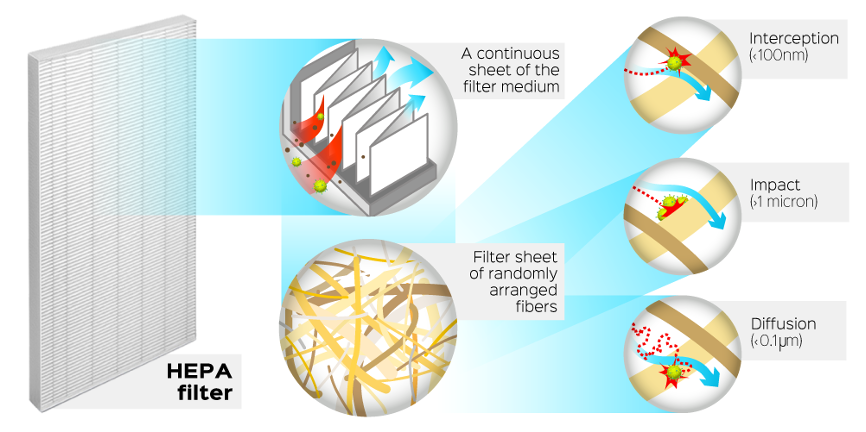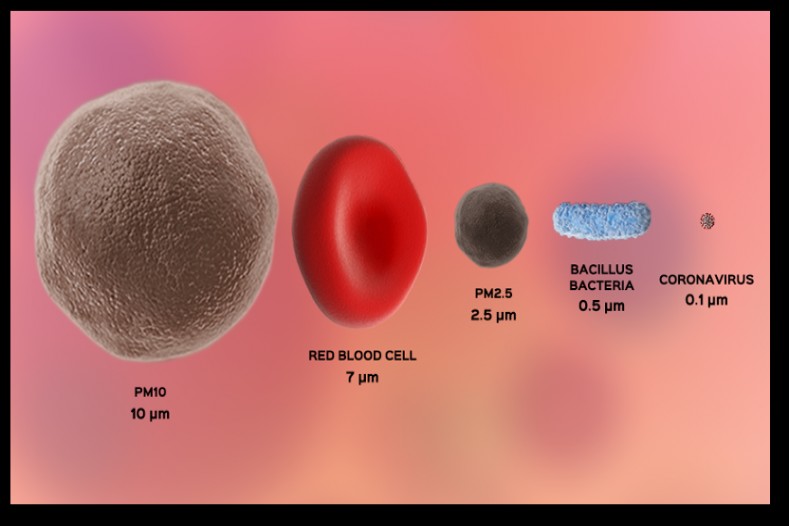Filtration Industry’s Respond to Pandemic
"Healthy buildings are the first line of defense against this novel coronavirus… We need more outdoor air and better filters."
Harvard Prof. Joseph Allen
 Air pollution has become a global problem and affects nearly all of us. Indoor air quality has become one of the most important issue over the past years as more and more countries shift their focus towards the health and well-being of building occupants in their daily life. Most people in the industrialized world spend up to 90% of their time indoors. The exposure to air contaminants, from dust to spores, bacteria, viruses, and chemical compounds has direct influence on people’s immune systems and can cause a variety of conditions, from allergies to cancer or - an epidemic disease like COVID-19.
Air pollution has become a global problem and affects nearly all of us. Indoor air quality has become one of the most important issue over the past years as more and more countries shift their focus towards the health and well-being of building occupants in their daily life. Most people in the industrialized world spend up to 90% of their time indoors. The exposure to air contaminants, from dust to spores, bacteria, viruses, and chemical compounds has direct influence on people’s immune systems and can cause a variety of conditions, from allergies to cancer or - an epidemic disease like COVID-19.
The global crisis due to Coronavirus has permeated every aspect of our healthcare systems. Since the advent of modern medicine with its understanding of communicable disease control and the related role of airborne pathogens, clean air has been closely linked to health-care facilities and the well-being of their occupants. Maintaining a healthy indoor air quality thus becomes a general, basic - yet extremely important - necessity. While this is always true, it is imperative in times of a wider health crisis to avoid not only the direct spread of a virus, but to support people's immune systems to withstand more serious impacts by an aggressive disease and thus reducing pressure on a healthcare system fighting against overload.a

As part of an effort to identify innovations that may help fight the Coronavirus outbreak, it is strongly believed that deploying commercial or industrial portable air purifiers with HEPA or ULPA air filters may help reduce the probability of contagion of the virus in locations where contact among people who have unknown or known risks are needed. Most air purifiers in the market adopt HEPA filters, as they are internationally recognized as the most efficient filters capturing particles in different diameters. While regular air filters are not designed to prevent the spread of viruses, these filters are essential in minimizing the risk as viruses tend to attach to airborne particulate matter and aerosols. Thus, regular filters with a high filtration efficiency (ePM1 filters) are crucial to reduce the risk of diseases transmitted through the air.
HEPA filters (High Efficiency Particulate Air) are mandatory in critical environments such as hospitals and healthcare facilities and can be also recommended for medium risk environments (high density of people) like airports, schools, or other public spaces. The filter captures 99.97% of particles above 0.3 microns in size, and 95% -99% - below 0.3 microns. Air filters are known to reduce the airborne presence of viral particles. The reduction of airborne particles by collection in the air filters can also reduce the deposition of viral particles on surfaces that are necessarily or inadvertently touched.

Filtering the air around a patient may reduce the viral load in their lungs decreasing the level of immune system activity that is needed for defeating this disease. Deploying air purifiers in the vicinity of a patient may thus lead to reduced severity of disease and improved outcomes.
For air filtration, efficient particulate air (EPA) filters, high-efficiency particle arrestance (HEPA) filters, and ultra-low penetration air (ULPA) filters have been widely used in various industries and applications for many decades. HEPA filters are recommended for infection control in healthcare settings based on the balance of their high filtration efficiency and lower pressure drops compared to ULPA.
Hospitals (and many healthcare facilities) have specially designed mechanical systems that can accommodate the levels of filtration that they need. They often rely on other systems and control strategies (e.g., UV lamps, humidity control, airflow management) to maximize the benefit from filtration. Most importantly, they have dedicated staff who operate and maintain this equipment so that it provides maximal benefit. Moreover, the use of masks, respirators, air filtration modules, and other dedicated equipment is an essential intervention in the management of COVID-19 spread.
HEPA filters are also deployed extensively in non-healthcare environments where airborne infectious agents may be present. In general, the greater the number of people in an indoor environment, the greater the need for ventilation with outdoor air. In other words, the ventilation rate should be based on the number of people that occupy an indoor space. In fact, CDC has stated that “Indoor spaces are more risky than outdoor spaces where it might be harder to keep people apart and there’s less ventilation.” Giving a special consideration to increased ventilation is important when occupancy is high. In addition to helping reduce risk from airborne transmission of viruses, improving ventilation also benefits indoor air quality by reducing exposure to products used for cleaning and disinfecting potentially contaminated surfaces.
As a conclusion, the ventilation industry offers effective solutions to tackle the pandemic by increasing ventilation and improving indoor filtration. Air filtration is of great importance in maintaining an active life of society, without causing harm to the health of its members.
Bibliography
Nazarenko, Yevgen. "Air filtration and SARS-CoV-2." Epidemiology and Health 42 (2020).
Joseph G. Allen - Associate Professor of Exposure Assessment Science at the Harvard T.H. Chan School of Public Health and the Director of the Harvard Healthy Buildings Program.
https://www.youtube.com/watch?v=OQ6DhgwgtGw&t=730s

